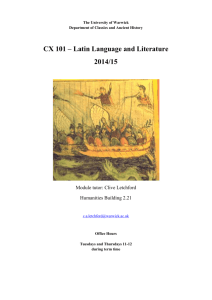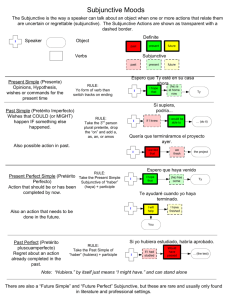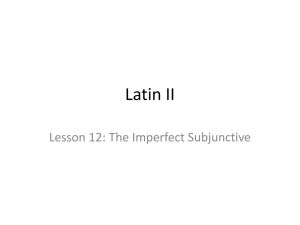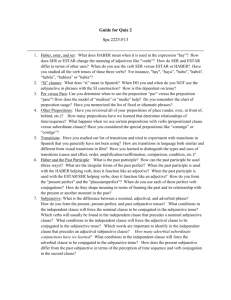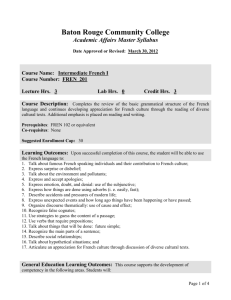The Latin Subjunctive
advertisement
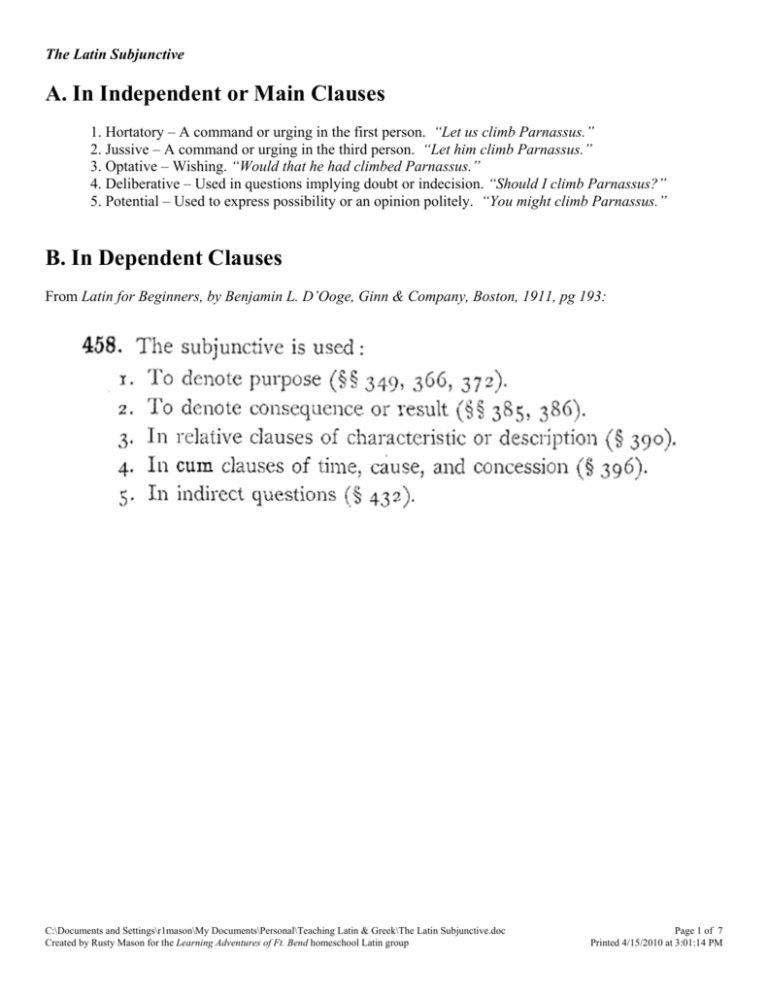
The Latin Subjunctive A. In Independent or Main Clauses 1. Hortatory – A command or urging in the first person. “Let us climb Parnassus.” 2. Jussive – A command or urging in the third person. “Let him climb Parnassus.” 3. Optative – Wishing. “Would that he had climbed Parnassus.” 4. Deliberative – Used in questions implying doubt or indecision. “Should I climb Parnassus?” 5. Potential – Used to express possibility or an opinion politely. “You might climb Parnassus.” B. In Dependent Clauses From Latin for Beginners, by Benjamin L. D’Ooge, Ginn & Company, Boston, 1911, pg 193: C:\Documents and Settings\r1mason\My Documents\Personal\Teaching Latin & Greek\The Latin Subjunctive.doc Created by Rusty Mason for the Learning Adventures of Ft. Bend homeschool Latin group Page 1 of 7 Printed 4/15/2010 at 3:01:14 PM The Latin Subjunctive A. The Subjunctive in Independent or Main Clauses A.1 Hortatory A command or urging in the first person. The main verb is in the present subjunctive. Negative: nē Pugnēmus. Let’s fight. Parnassum videam. Let me see Parnassus. Nē cedāmus. Let us not yield. A.2 Jussive A command or urging in the third person. The main verb is in the present subjunctive. Negative: nē Nē pugnent. Let them not fight. Nē arborem ascendat. Let him not climb a tree. Parnassum conētur. Let him attempt Parnassus. A.3 Optative Utinam (if only, would that) is optional in all three cases. Negative: nē Wishes capable of fulfillment use the present subjunctive. (Utimam) veniat. Would that he might come. (Utimam) nē veniat. If only he would not come. Dī tē ament. May the gods love you. Wishes incapable of fulfillment in the present use the imperfect subjunctive. (Utimam) Caesar vīreret. Would that Caesar were living. (Utimam) nē adessēs. Would that you were not present. If only … (Utimam) Caesar adesset. Would that Caesar were here. Wishes incapable of fulfillment in the past use the pluperfect subjunctive. (Utimam) Caesar vēnisset. Would that Caesar had come. (Utimam) nē Caesarem occīdissent. Would that they had not killed Caesar. If only … (Utimam) mē vīdissēs. Would that you had seen me. A.4 Deliberative Used in (often rhetorical) questions implying doubt or impossibility. Negative: nōn Use present subjunctive for present time. Quid faciam? What should I do? Utrum hīc maneam an arborem ascendam? Should I stay here or climb the tree? Hanc nāvem nōn capiāmus? Should we not seize this ship? Use imperfect subjunctive for past time. Quid facerent? Pecūniam nōn trāderem? Quid dīcerem? What were they to do? Was I not to hand over the money? What was I supposed to say? C:\Documents and Settings\r1mason\My Documents\Personal\Teaching Latin & Greek\The Latin Subjunctive.doc Created by Rusty Mason for the Learning Adventures of Ft. Bend homeschool Latin group Page 2 of 7 Printed 4/15/2010 at 3:01:14 PM The Latin Subjunctive A.5 Potential Used to express a possibility or an opinion, politely and tentatively. The second person singular and third person plural are usually indefinite. Negative: nōn Use present subjunctive and perfect subjunctive for present time. Pōtum velim (nōlim, mālim). Hīs crēdās. Aliquis id dīxerit. Eum nōn esse hominem bonum dīcās. I should like (should not like, should prefer) a drink. You (one, a person) might believe these things. Someone might say that. You might say he is not a good person. Use imperfect subjunctive for past time. Vidērēs (cernerēs, putārēs). Crēderēs. Dīcerēs eum hominum bonus esse. You might have seen (observed, thought). One may (a person) have believed. One might have said he was a good man. C:\Documents and Settings\r1mason\My Documents\Personal\Teaching Latin & Greek\The Latin Subjunctive.doc Created by Rusty Mason for the Learning Adventures of Ft. Bend homeschool Latin group Page 3 of 7 Printed 4/15/2010 at 3:01:14 PM The Latin Subjunctive B. The Subjunctive in Dependent Clauses ut, conj., that, in order that; to nē, conj., in order that not, that not, lest quī, the relative pronoun quō, (abl. of quī, by which), in order that, that; used when the purpose clause contain a comparitive. The ablative, quō, expresses the measure of difference. ubi, conj., where B.1 Purpose A clause expressing purpose takes the subjunctive. In English, purpose clauses are sometimes introduced by that or in order that, but much more frequently purpose is expressed in English by the infinitive, as He advises us to remain at home. Purpose is never expressed by the infinitive in Latin prose! The English phrases below are literal translations. Noun Clause: A substantive (“noun”) clause of purpose with the subjunctive is used as the object of verbs commanding, urging, asking, persuading, or advising, where in English we should usually have the infinitive. Indirect Commands are included in this grouping. D’Ooge §§ 366 - Nōbīs persuādēbit nē proficīscāmur. - Monet ut domī maneāmus. - Imperātor mīlitibus imperāvit ut currerent. - Ōrō ut nautam superēs. - Ōrābam ut nautam superārēs. - Ōrāvī ut verba cum veniā audīrēs. He will persuade that we should not set out. He advises that we should remain at home. The general ordered that the soldiers should run. I beg that you should overcome the sailor. I begged that you should overcome the sailor. I begged that you would hear my words with indulgence. Noun Clause: Verbs of Fearing. Nē for positive and ut for negative with verbs of fearing (opposite of expected). - Timeō nē veniat. - Timeō ut veniat. - Timeō nē nōn veniat. - Veritus est nē canis mordēret. - Timēmus ut amīcī salvī sint. I fear that (lest) he is coming. I fear that he is not coming. I fear that (lest) he is not coming. He was afraid that (lest) the dog would bite. We are afraid that our friends are not safe. Adjectival Clause: An adjectival clause is also called a relative clause. It qualifies, like an attribute, the main clause on which it depends. It is introduced by a relative pronoun or an equivalent. D’Ooge §§ 349 - Caesar hominēs mittet quī pontem reperiant. - Equitēs mīsit quī oppidum caperent. - Locum ubi castra pōneret ēlēgit. Caesar sends men who would find the bridge. He sent men who should take the town. He selected a place where he might pitch camp. Adverbial Clause: Expresses the why, when, or how of the main verb. D’Ooge §§ 372 - Pācem petunt ut domum revertantur. - Mīlitēs veniunt ut agrōs vāstent. - Fugiunt nē vulnerentur. - Pontem faciunt quō facilius oppidum capiant. They ask for peace in order that they may return home. Soldiers come in order that they may lay waste the fields. They flee that not (or lest) they might be wounded. They build a bridge by which the more easily they may take the town. C:\Documents and Settings\r1mason\My Documents\Personal\Teaching Latin & Greek\The Latin Subjunctive.doc Created by Rusty Mason for the Learning Adventures of Ft. Bend homeschool Latin group Page 4 of 7 Printed 4/15/2010 at 3:01:14 PM The Latin Subjunctive B.2 Result D’Ooge §§ 385, 386 Noun Clause: Object clauses of result with ut or ut nōn are found after verbs of effecting or bringing about. - Accidit ut nōs nōn vidēret. - Sequitur ut bonus sit. - Effēcit ut pōns fieret. - Fac nē cui noceās. - Perīculum fēcit ut omnēs fugerent. It happened that he did not see us. (What is the thing that happened?) It follows that he is good. (What is the thing that is good?) He brought it about that a bridge was made. (What thing was brought about?) See to it that you do not harm anyone. (See to what thing?) The danger made so that all fled. (What thing was made to happen?) Adjectival Clause: An adjectival clause is also called a relative clause. It qualifies, like an attribute, the main clause on which it depends. It is introduced by relative pronoun or an equivalent. - Nōn is est quī hoc dīcat. - Nihil est tam malum quod mūtarī nōn possit. - Quis est tam invidus quī ab eo nos abducat? He is not one who would say this. There is nothing so bad that it is not possible to be changed. Who is so envious that he would withhold us from it? Adverbial Clause: Introduced by ut, ut nōn, quī/quae/quod. Often preceded in the main clause by such words as tam, ita, sīc (so), talis, tantus, adeō. - Sīc vītam ēgit ut omnēs eum laudārent. - Ita fortiter pugnāvērunt ut vincerent. - Sīc oppidum mūniēbātur ut nōn expugnārētur. - Tam alta est mōns ut nōn ascendere possīmus. (How did he live?) He so lived that everyone praised him. They fought so bravely that they conquered. (How bravely?) The town was so fortified that it was not captured. (How fortified?) The mountain is so high that we cannot climb (it). (How high?) B.3 Description or Characteristic D’Ooge, §§ 390: This is similar to the subjunctive of consequence or result. A relative clause with the subjunctive may be used to describe and antecedent. Henle, pg 135: It is frequently impossible to distinguish a characteristic clause from a relative clause of result or cause. Adjectival Clause: An adjectival clause is also called a relative clause. It qualifies, like an attribute, the main clause on which it depends. It is introduced by relative pronoun or an equivalent. - Nēmo est quī hoc nesciat. - Quis est quī hoc crēda? - Virtūs tua digna est quae laudētur. - Quis est quī suam domum nōn amet? - Erant quī hoc facere nōllent. - Tū nōn is es quī amīcōs trādās. - Nihil videō quod timeam. There is no one who does not know this. Who is there that believes this? Your courage is what should be praised. Who is there who does not love his own home? There were (some) who were unwilling to do this. You are not one who would betray your friends. I see nothing that I would fear. - Caesar est is quī nōs ducit (indicative). - Caesar est is quī nōs ducat. Caesar is the man who is leading us. (Simple statement of fact.) Caesar is the man who would lead us. (Possibility.) - Is est quī celetiter ambulat. - Is est quī celeriter ambulet. He is the (actual) man who walks fast. (Simple statement of fact.) He is the (kind of) man who would walk fast. (General characterization.) C:\Documents and Settings\r1mason\My Documents\Personal\Teaching Latin & Greek\The Latin Subjunctive.doc Created by Rusty Mason for the Learning Adventures of Ft. Bend homeschool Latin group Page 5 of 7 Printed 4/15/2010 at 3:01:14 PM The Latin Subjunctive B.4 Cum Clauses of Time, Cause, and Concession All adverbial. D’Ooge §§ 396 Circumstantial “Cum” Clause: Shows the circumstances that attended or preceded the main clause. Cum means when. - Cum omnēs pervenissent, servi potiones attulerunt. When everyone had arrived, the slaves brought in the drinks. - Cum tē vidērem, fēlix eram. When I saw you, I was happy. - Cum pācem peterent, Caesar in eōs impetum nōn fēcit. When they were seeking peace, Caesar did not attack them. - Puer, cum consilium audīvisset, contentus erat. The boy, when he had heard the plan, was pleased. - Cum hostēs vīdisset, legiōnēs īnstrūxit. When he had seen the enemy, he drew up the legions. Temporal “Cum” Clause: If the time relationship to the main clause is stressed, or the present or future is used, the indicative is usually used. Cum means when, at the time when, etc.. - Cum omnēs pervenerant, servī potionēs attulērunt. - Cum tē vīdī, fēlix eram. - Caesarem vīdī tum cum in Galliā eram. - Cum vincimus, tum pācem spērās. - Veniam cum poterō. - Cum adest, nihil timēmus. When everyone had arrived, the slaves brought in the drinks. (At the very time) when I saw you, I was happy. I saw Caesar at the time when I was in Gaul. (Of course) while we are winning, you are hoping for peace. I will come when I can. (I have limited time). When he is present, we fear nothing. Causal “Cum” Clause: Introduces the reason for the main clause. Cum means since or because. - Cum omnēs pervenissent, servi potionēs attulērunt. - Cum tē videam, fēlix sum. - Cum tē vidērem, fēlix eram. - Cum tē vīderim, fēlix sum. - Cum tē vīdissem, fēlix eram. - Hoc erat difficile, cum paucī sine vulneribus essent. Since everyone had arrived, the slaves brought in the drinks. Since (because) I see you, I am happy. Since (because) I saw you, I was happy. Since (because) I saw you, I am happy. Since (because) I had seen you, I was happy. This was difficult, since only a few were without wounds. Concessive “Cum” Clause: Cum means yet or although. Tamen may or may not be used. - Cum paucī modō pervenissent, servī (tamen) potionēs attulērunt. - Cum tē videam, fēlix (tamen) sum. - Cum tē vidērem, fēlix (tamen) eram. - Cum tē vīderim, fēlix (tamen) sum. - Cum tē vīdissem, fēlix (tamen) eram. - Cum ōrdinēs fūgissent, tamen reliquī cōnsistēbant. Although only a few had arrived, the slaves brought in the drinks anyway. Although I see you, (nevertheless) I am happy. Although I saw you, (nevertheless) I was happy. Although I saw you,(nevertheless) I am happy. Although I had seen you, (nevertheless) I was happy. Though ranks had fled, yet the rest stood their ground. C:\Documents and Settings\r1mason\My Documents\Personal\Teaching Latin & Greek\The Latin Subjunctive.doc Created by Rusty Mason for the Learning Adventures of Ft. Bend homeschool Latin group Page 6 of 7 Printed 4/15/2010 at 3:01:14 PM The Latin Subjunctive B.5 Indirect Questions Expect a question word (what, why, where, how, etc.) to introduce the indirect question, whose verb is subjunctive. There will not necessarily be any verb of asking. The subjunctive verb’s tense is determined by the law for tense sequence. It is translated like an indicative. D’Ooge §§ 432 - Direct: Quis Gallōs vincit? - Indirect: Rogat quis Gallōs vincat. - Indirect: Rogāvit quis Gallōs vinceret. Who is conquering the Gauls? He asks, Who is conquering the Gauls. He asked, Who was conquering the Gauls. - Direct: Ubi est Rōma? - Indirect: Rogat ubi sit Rōma. - Indirect: Rogāvit ubi esset Rōma. Where is Rome? He asks, Where is Rome. He asked, Where was Rome. - Direct: Caesarne Gallōs vīcit. - Indirect: Rogat num Caesar Gallōs vīcerit. - Indirect: Rogāvit num Caesar Gallōs vīcisset. Did Caesare conquer the Gauls? He asks whether Caesar conquered the Gauls. He asked whether Ceasar had conquered the Gauls. Indirect statements use the indicative mood. D’Ooge §§ 415 - Dīcit – or – Dīxit Gallōs esse fortis. - Dīcit – or – Dīxit Gallōs fuisse fortis. - Dīcit – or – Dīxit Gallōs futūrōs esse fortis. He says – or – He said the Gauls to be brave. He says – or – He said the Gauls to have been brave. He says – or – He said the Gauls to be about to be brave. B.6 Priviso or Conditional Wish Adverbial Clause: Modo, dum, dummodo, and sī modo (which all mean, if only, provided only, as long as, etc.) are used to express conditional wishes with the present and imperfect subjunctives. Tense by sequence. Negative: nē. - Ōderint, dum metuant. - Manēbō dummodo tū nē fugiās. - Id saepe faciat, modo nē miser fīat. Let them hate, provided only they fear. I shall remain provided you do not flee. Let him do this often, provided that he does not become unhappy. Future less vivid: Present subjunctive in both clauses. - Sī labōret, fēlix sit. If he should work, he would be happy. Present Contrary to Fact: Imperfect subjunctive in both clauses. - Sī labōrāret, fēlix esset. If he were (now) working (but he is not), he would be happy. Past Contrary to Fact: Pluperfect subjunctive in both clauses. - Sī labōrāvisset, fēlix fuisset. If he had (in the past) worked (but he did not), he would have been happy. Simple Conditional: Use the indicative. - Sī labōrat, fēlix est. - Sī labōrābat, fēlix erat. If (whenever) he works, he is happy. If (whenever) he worked, he was happy. C:\Documents and Settings\r1mason\My Documents\Personal\Teaching Latin & Greek\The Latin Subjunctive.doc Created by Rusty Mason for the Learning Adventures of Ft. Bend homeschool Latin group Page 7 of 7 Printed 4/15/2010 at 3:01:14 PM


